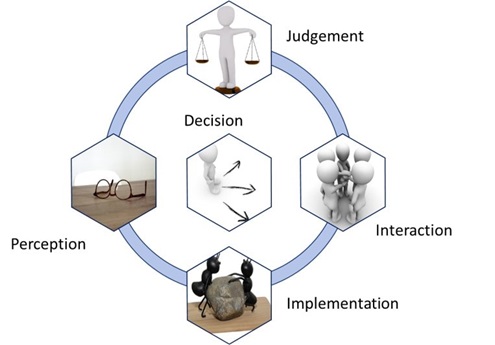Effects of biases in companies and effective countermeasures
Unconscious biases - an interesting hobby or is there more to it?
Highly paid management, top leadership programmes and increased automation - this quickly gives the impression that rational decisions are the norm in companies. It is precisely this image that is dangerous - the strong belief in one's own abilities and the widespread opinion that one is immune to biases (the so-called bias blind spot) pose a fundamental risk, especially for the core area of every company.
A lot is at stake in today's business world - biases in companies can have a massive impact. They work in many ways

Decision-making processes in companies - massively distorted by unconscious biases
Unconscious biases (= cognitive distortions or errors in thinking) are often behind bad decisions. A study by the University of Giessen showed that
- 72% of those surveyed attributed past bad decisions in part to biases,
- 90% of respondents see biases as a factor of negative consequences for their company, but only
- 12% of the respondents have systematically implemented countermeasures (= de-biasing) in their decision-making processes.
This means that decision-making processes in companies must take into account the specific effective biases.
De-biasing is an essential factor for excellence in management decisions - also for you!
Biases cause costs and failures in companies
Unconscious biases are directly linked to the way the human brain works (read more: background to biases). We are usually not aware of them, but they have an effect in companies as well as in private life.
In organisations, unconscious biases rarely show up directly, but rather their effects. Studies and surveys (e.g. by McKinsey and the Economist Intelligence Unit) have shown, for example, that:
- only 28% of the executives surveyed describe their company's strategic decisions as good;
- for the majority of business decisions, intuition plays a stronger role in judgement than data and facts;
- most executives believe that their employees predominantly use readily available information.
Biases and the resulting wrong decisions can have a serious impact:
- strategically (for example in strategy creation, in wrong investments, in the assessment of competitors,...),
- culturally (e.g. to find, promote and retain the right employees, to live diversity, on ethical issues,...)
- financial (e.g. in pricing policy, wrong allocation of resources, performance appraisal,...).
Why do the same mistakes happen to us again and again? The founder of Mind your Business asked himself this question many years ago in his corporate role - read more under Why de-biasing?
What the weak head with stronger bias rules, is pride, the never-failing vice of fools - Alexander Pope
Effects in companies
Unconscious biases are deeply rooted both on a personal level and in corporate cultures and processes. They easily cause "blind spots" especially at the core of the business. Thinking errors and distorted perceptions thus pose a significant risk to the success, or in the worst case, the existence of the organisation.
Their impact is more tangible when we put them in context. Questions arise such as:
- Perception:
- How do we interpret the actions of our competitors?
- What information is relevant, what is not?
- How do we perceive the competencies of different people?
- Assessment
- What are the priorities?
- How much will our business areas grow in the future?
- How profitable is the new expansion project?
- Decision
- Where do we invest?
- Who do we hire, who do we promote and who do we not?
- What prices do we charge for our products?
- Interaction
- How do we make decisions in the management team?
- What do we emphasise in presentations?
- How do we communicate between different hierarchical levels?
- Implementation
- What steering measures do we need to get back on track?
- What is currently preventing us from implementation?
- Who is performing well, who is not?

These questions are by far not sufficient; the interconnections of the five areas are also well demonstrated.
Decisive questions are:
- Which issue is unimportant for your business success, which is quite central?
- Which issue makes the difference to your competitor?
- Which aspect poses the greatest risk to the organisation?
It is advisable to focus on where the impact is greatest and the error rate highest.
Specific and individual measures are then needed, depending on the context, the business model and the relevant processes. The de-biasing concept is designed to start where it makes the most sense for you.
Tip: practical workshops and webinars
In the workshops and webinars section you find all the current events that deal with biases, effects and countermeasures
- for a specific topic or
- for an operational function.
The workshops and webinars always make a concrete reference to the corporate world and deal with practical examples.
De-biasing works in companies
I had the opportunity to systematically improve processes during my time in the company. Decisions were often the focus. It often doesn't take big steps, but very specific and individual ones. Anchoring these successfully and creating new routines takes time, focus and regular repetition.
De-biasing is a process, not an event - it has a lasting effect on companies.
Biases are expensive, biases are avoidable.
Clear thinking, conscious decisions and effective implementation are prerequisites for personal and business success.
The de-biasing concept of Mind your business is modular - together we develop the measures that really work.

Why it makes sense to improve decision-making processes in companies - for you too.
Why does it pay to invest in the quality of decision-making - what is the business case?
Often there are already structures for decision-making processes in companies - for example, it is defined who decides on which topics (governance):
- who decides on which issues (governance),
- with whom the decision is made (for example, alone or in committees),
- the process by which information is shared (process descriptions),
- according to which criteria decisions are made (business case content), or
- how the success of the decisions made is measured.
Organisations can have all these elements implemented and still be far from excellence.
Your performance management system should give you a clear picture of where you stand (if not, Mind your your business will be happy to support you - see the Controlling & Finance section for more details).
For example:
- what percentage of your investment projects are on time & on budget?
- how do your sales prices compare to those of your competitors? or
- how does your staff turnover compare to the industry average?
Your business case is the step from average to good, from good to very good or from very good to excellent - these steps can have enormous financial benefits.
The management consultancy McKinsey, for example, has found that the quality of decision-making processes in companies has a significantly stronger leverage on company performance than mere analysis - by a factor of 6!
Do you know which management decisions have the greatest business case?

De-biasing - major companies are already working on implementation
As central positive effects in the corporate context, McKinsey has ascertained that
- de-biasing of decision-making processes is significantly more important than the analysis of data - by a factor of 6!
- the profits of companies benefit from de-biasing - they are 7% points higher than companies that do not de-biase.
In recent years, well-known companies have recognised the importance of de-biasing. US based companies in particular, such as Facebook or Google, are working on targeted measures for their employees.
You are therefore in good company if you define and implement de-biasing measures in a targeted manner!
Decisively better is an offer to companies to achieve excellence in management decisions step by step, de-biasing included.
